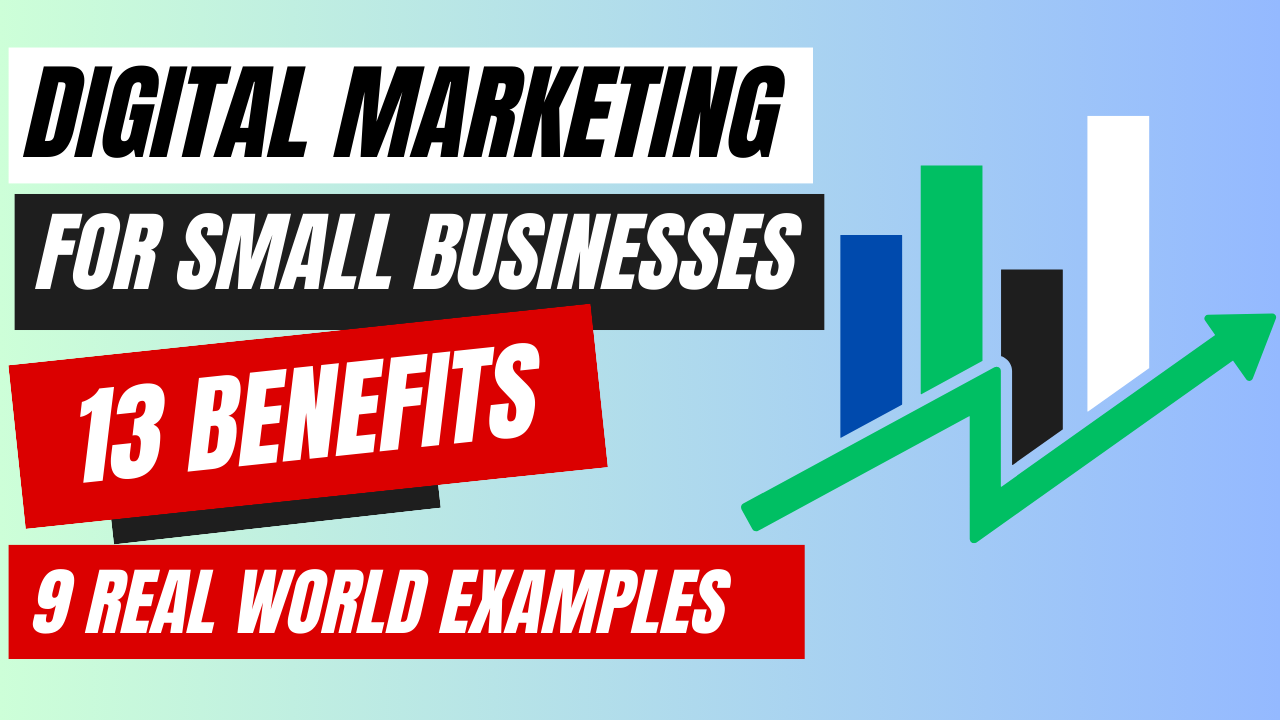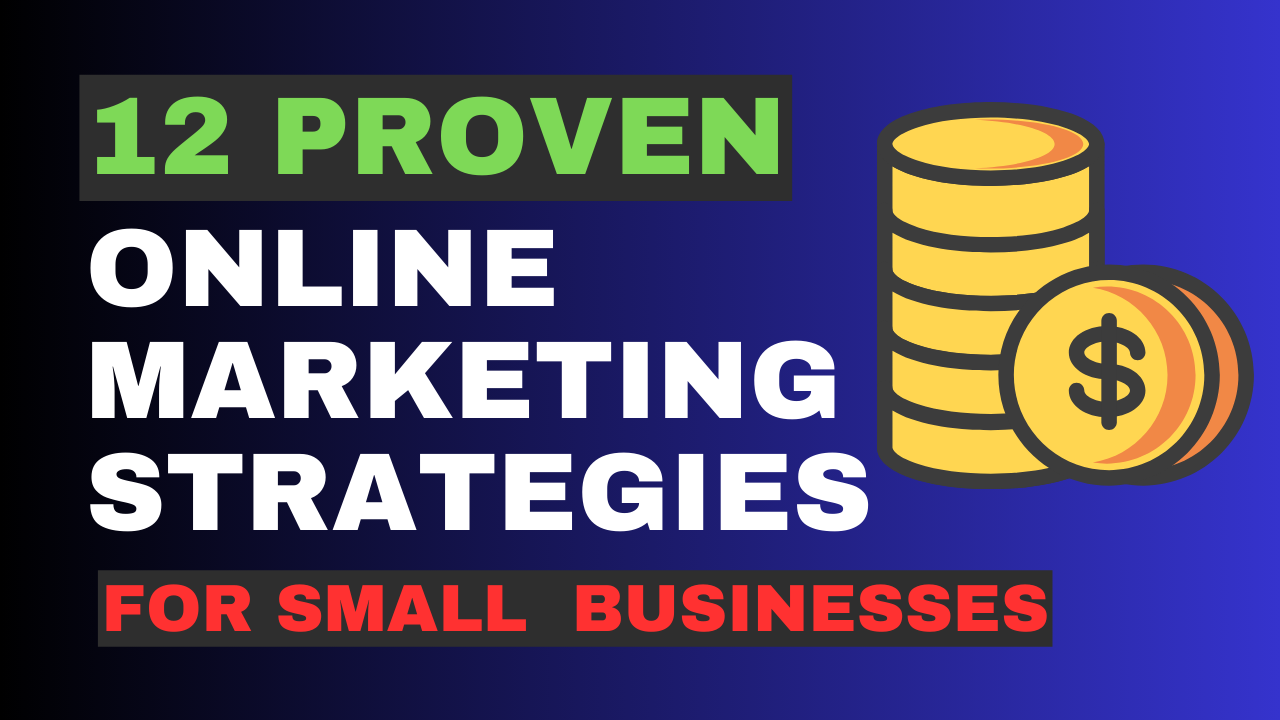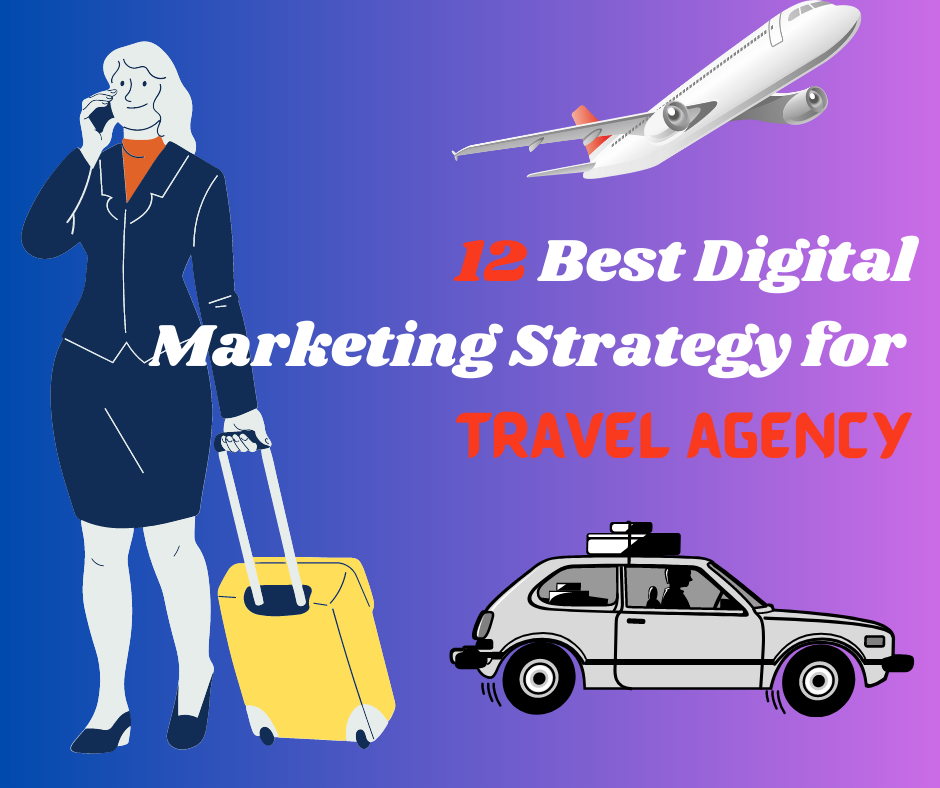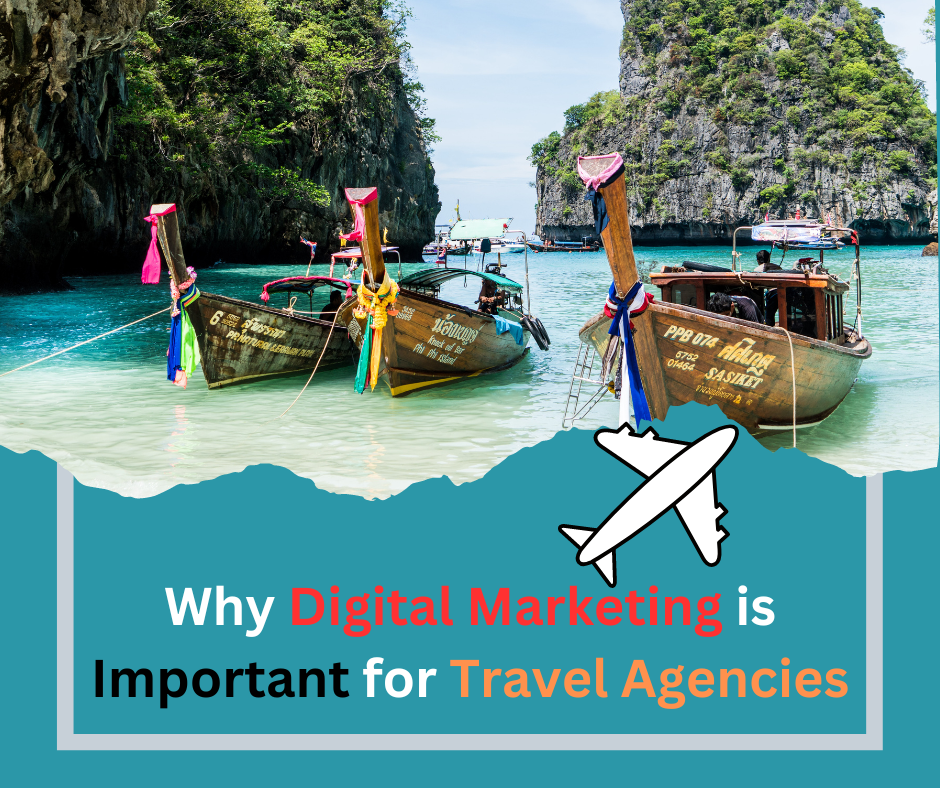Updated 21st October 2023
Digital marketing is essential for small businesses because it allows them to reach a large audience at a relatively low cost. It also gives them the ability to target their marketing efforts to specific demographics and interests.
Digital marketing is the use of online channels to promote or market products or services to consumers and businesses. It encompasses a wide range of activities, including search engine optimization (SEO), social media marketing, content marketing, email marketing, and pay-per-click (PPC) advertising.

1. Introduction
Small businesses play a vital role in the economy, but to succeed, they need to adapt to the digital age. In this article, we will explore various strategies and techniques that can help small businesses harness the power of digital marketing to grow their brand, connect with their target audience, and ultimately boost their revenue.
2. Understanding the Importance of Digital Marketing for Small Businesses
Digital marketing for small businesses is not just an option; it’s a necessity for survival. We’ll delve into why establishing a strong online presence is crucial for success and how it can level the playing field against larger competitors.
3. Defining Your Target Audience
Identifying and understanding your target audience is the cornerstone of effective digital marketing. We’ll discuss how to create buyer personas and tailor your strategies to resonate with your ideal customers.
4. Building a User-Friendly Website
Your website is your online storefront. We’ll explore the elements of a user-friendly website and how it can improve user experience, leading to higher conversion rates.
5. Leveraging the Power of SEO for Small Businesses
Search Engine Optimization (SEO) is a powerful tool for improving your website’s visibility in search engines. We’ll dive into the basics of SEO for small businesses and how to optimize your website for better organic rankings.
6. Creating Engaging Content
Content is king in the digital marketing realm. Learn how to create valuable and engaging content that not only attracts visitors but also keeps them coming back for more.
7. Harnessing the Potential of Social Media
Social media platforms provide a unique opportunity for small businesses to connect with their audience on a personal level. Discover strategies for effective social media marketing.
8. Email Marketing: An Effective Tool
Email marketing remains one of the most cost-effective ways to nurture leads and retain customers. We’ll discuss best practices for creating compelling email campaigns.
9. Paid Advertising on a Budget
You don’t need a massive budget to run effective paid advertising campaigns. We’ll explore cost-efficient strategies to get the most out of your advertising spend.
10. Measuring and Analyzing Results
To improve your digital marketing efforts, you need to measure and analyze your results. Learn how to use data to make informed decisions and optimize your strategies.
11. Staying Ahead of the Competition
Small businesses need to be innovative and stay ahead of the competition. We’ll provide insights into how to identify your competitors and outshine them in the digital space.
12. Mobile Optimization
With the rise of mobile devices, optimizing your website for mobile users is essential. Discover the best practices for mobile optimization to reach a broader audience.
13. Reputation Management
Online reputation can make or break a small business. Learn how to manage and enhance your online reputation to build trust with your audience.
14. Scaling Your Digital Marketing Efforts
As your business grows, so should your digital marketing efforts. We’ll discuss strategies for scaling your campaigns and expanding your reach.
10 Best tips for doing digital marketing for small businesses
Here are 10 best tips for doing digital marketing for small businesses:
- Create a website that is mobile-friendly and easy to navigate. Your website is your online storefront, so it’s important to make a good impression. Make sure your website is well-designed, informative, and easy to use on both desktop and mobile devices.
- Optimize your website for search engines. SEO is the process of optimizing your website so that it ranks higher in search engine results pages (SERPs). When people search for keywords related to your business, you want your website to appear near the top of the SERP. There are a number of things you can do to improve your SEO, such as using relevant keywords throughout your website, creating high-quality content, and building backlinks from other websites.
- Be active on social media. Social media is a great way to connect with potential customers and promote your business. Choose the social media platforms that your target audience is most active on and post engaging content on a regular basis. You can also use social media advertising to reach a wider audience.
- Create high-quality content. Content marketing is the process of creating and distributing valuable, relevant, and consistent content to attract and retain a clearly defined audience and drive profitable customer action. Content can take many forms, such as blog posts, articles, infographics, videos, and e-books. When you create high-quality content, you position yourself as an expert in your field and attract potential customers to your website.
- Use email marketing to stay in touch with customers. Email marketing is a great way to stay in touch with customers and promote your products or services. You can use email marketing to send out newsletters, special offers, and other updates. Just be sure to only email people who have given you their permission to be contacted.
- Consider using PPC advertising. PPC advertising is a type of online advertising where you pay each time someone clicks on your ad. PPC can be a great way to quickly drive traffic to your website and generate leads. However, it’s important to set a budget for PPC advertising and track your results carefully.
Digital marketing can be a complex and ever-changing field, but it’s essential for small businesses to succeed online. By following the tips above, you can develop a digital marketing strategy that will help you reach your target audience and grow your business.
13 Benefits of Digital Marketing for Small Businesses
In today’s rapidly evolving business landscape, digital marketing benefits have become an indispensable tool for small businesses aiming to thrive and grow. This section explores the 13 advantages of digital marketing for small businesses, shedding light on how it can revolutionize the way small businesses connect with their target audience, increase their brand visibility, and boost their bottom line.
- 1. Enhanced Online Visibility: Digital marketing allows small businesses to establish a robust online presence. Through search engine optimization (SEO) techniques, they can ensure that their website ranks high on search engine results pages (SERPs), making it easier for potential customers to find them.
- 2. Cost-Effective Marketing: Traditional marketing methods often come with a hefty price tag. Digital marketing, on the other hand, offers cost-effective solutions, such as pay-per-click (PPC) advertising, email marketing, and social media promotions, allowing small businesses to maximize their budget.
- 3. Precise Audience Targeting: One of the standout features of digital marketing is the ability to target specific demographics and interests. This ensures that marketing efforts are directed towards individuals most likely to convert into customers, saving time and resources.
- 4. Measurable Results: Unlike traditional marketing, digital marketing provides clear and measurable results. Small businesses can track website traffic, conversion rates, and engagement levels, allowing them to fine-tune their strategies for optimal outcomes.
- 5. Improved Customer Engagement: Engaging with customers is vital for small businesses. Digital marketing facilitates two-way communication, enabling businesses to respond to customer inquiries promptly and build stronger relationships.
- 6. Competitive Edge: Digital marketing empowers small businesses to compete with larger corporations on a global scale. With the right strategies, they can carve out a niche for themselves and reach audiences far beyond their local market.
- 7. 24/7 Accessibility: The internet never sleeps, and neither does digital marketing. Small businesses can reach their target audience at any time of the day or night, ensuring constant visibility.
- 8. Enhanced Data Analytics: Digital marketing platforms provide valuable insights into customer behavior. This data can be used to refine marketing strategies, create more personalized content, and make informed decisions.
- 9. Global Reach: Through digital marketing, small businesses can extend their reach to a global audience. This opens up exciting opportunities for expansion and growth.
- 10. Builds Brand Credibility: A strong online presence and positive customer interactions build trust and brand credibility for small businesses. Consumers are more likely to choose a brand they recognize and trust.
- 11. Adaptability and Flexibility: Digital marketing allows for real-time adjustments. Small businesses can quickly adapt to changing market conditions and customer preferences, ensuring they stay relevant.
- 12. Greater Personalization: Personalization is a cornerstone of effective digital marketing. Small businesses can tailor their messages and offers to individual customers, increasing the likelihood of conversions.
- 13. Effective Content Marketing: Creating valuable and engaging content is key to digital marketing success. Small businesses can use blogs, videos, and social media posts to showcase their expertise and attract a loyal following.
5 Examples of How Small Businesses are using Digital Marketing to achieve their Goals
- A local coffee shop uses social media to promote its daily specials and events, and to run contests and giveaways. It also uses social media advertising to target people who live and work nearby.
- A small retail store uses email marketing to send out coupons and discounts to its customers. It also uses email marketing to promote new products and to announce upcoming sales.
- A professional services business uses search engine optimization (SEO) to improve its website’s ranking in search engine results pages (SERPs). This makes its website more visible to potential customers who are searching for the services it offers.
- An e-commerce business uses pay-per-click (PPC) advertising to drive traffic to its website and generate sales. It also uses social media advertising to target potential customers and promote its products.
- A small business that sells handmade jewelry uses Instagram to showcase its products and to connect with potential customers. It also uses Instagram advertising to target people who are interested in fashion and jewelry.
These are just a few examples of how small businesses can use digital marketing to achieve their goals. There are many other ways to use digital marketing, and the best approach will vary depending on the specific business and its target audience.
9 Real-World Examples of Digital Marketing Strategies employed by Small Businesses in India
- Social Media Advertising – Chaayos: Chaayos, a chain of tea cafes in India, uses social media platforms like Facebook and Instagram to run targeted ad campaigns. They create engaging content and promote it to reach a wider audience. For instance, they may create a post highlighting their new tea flavors and promote it to tea enthusiasts in specific geographic areas.
Stats:
- Chaayos’ Facebook and Instagram ad campaign reached over 1.5 million users in a month.
- Conversion rates for their online tea orders increased by 20% during the campaign.
- Content Marketing – YourStory: YourStory, a media platform that covers startups and entrepreneurship in India, utilizes content marketing to engage its audience. They publish articles, videos, and podcasts about Indian startups and entrepreneurs, driving traffic through SEO and social media sharing. This not only attracts readers but also builds their credibility in the startup ecosystem.
Stats:
- YourStory’s website traffic increased by 30% within six months of consistently publishing high-quality startup content.
- They achieved a 15% growth in their newsletter subscribers, reaching a total of 200,000 subscribers.
- Email Marketing – Lenskart: Lenskart, an online eyewear retailer, leverages email marketing effectively. They send personalized emails to their customers, notifying them of discounts, new arrivals, and special offers. By segmenting their email list based on past purchases and user behavior, they send targeted content that resonates with their subscribers.
Stats:
- Lenskart’s email open rates average at 25%, which is significantly higher than the industry average of 15%.
- Their segmented email campaigns resulted in a 10% increase in online sales.
- Google My Business – Local Restaurants: Many small local restaurants in India use Google My Business to improve their online visibility. They create profiles with detailed information, including photos, menus, and reviews. This helps them appear in local search results when people look for places to eat in their vicinity.
Stats:
- Local restaurants saw a 50% increase in click-through rates to their websites after optimizing their Google My Business profiles.
- 30% of their walk-in customers mentioned finding the restaurant through Google.
- Influencer Marketing – Mamaearth: Mamaearth, a brand specializing in natural and organic baby care products, collaborates with parenting influencers on platforms like Instagram and YouTube. These influencers create content showcasing Mamaearth’s products and their benefits, which helps in building trust among their target audience.
Stats:
- Influencer marketing campaigns generated a 15% increase in sales for Mamaearth’s products.
- Instagram posts featuring Mamaearth products received an average of 10,000 likes and comments.
- Search Engine Optimization (SEO) – BharatMatrimony: BharatMatrimony, one of India’s largest online matrimonial services, invests in SEO to rank high in search engine results for relevant keywords like “Indian matrimony” or “Indian bride and groom search.” This strategy ensures that their website appears prominently when users search for matrimonial services.
Stats:
- Organic search traffic accounts for 70% of BharatMatrimony’s website visitors.
- They rank on the first page of Google for key industry-specific keywords, resulting in over 1 million monthly organic visitors.
- Pay-Per-Click (PPC) Advertising – UrbanClap (now Urban Company): UrbanClap, a home services marketplace, uses PPC advertising on platforms like Google Ads to acquire customers. They bid on keywords related to services they offer (e.g., “plumber in Delhi”) and pay only when users click on their ads and book a service.
Stats:
- UrbanClap’s PPC campaigns achieved a 12% click-through rate (CTR) and a 6% conversion rate.
- They saw a 25% increase in service bookings through PPC advertising.
- WhatsApp Marketing – Local Retailers: Many small retailers in India use WhatsApp to connect with their customers. They share product catalogs, offer promotions, and handle customer inquiries through WhatsApp. It’s a cost-effective way to engage with a local customer base.
Stats:
- Local retailers reported a 40% increase in repeat customers due to personalized WhatsApp promotions.
- Customer inquiries via WhatsApp led to a 15% boost in sales.
- Video Marketing – Swiggy: Swiggy, a food delivery app, uses video marketing to create engaging ads and promotional content. They run video ads on YouTube and social media to showcase their food delivery service and exclusive offers.
Stats:
- Swiggy’s YouTube video ads received over 5 million views, resulting in a 20% increase in app downloads.
- Engagement metrics such as likes and shares were 30% higher for video content compared to static ads.
These are just a few examples of how small businesses in India are utilizing digital marketing strategies to reach and engage with their target audience effectively. Digital marketing has become increasingly important in the Indian market, offering cost-effective ways for businesses to promote their products and services.
8 Real World Examples of Digital Marketing for Small Businesses
Small businesses often face budget constraints, making traditional marketing methods less accessible. However, digital marketing levels the playing field, allowing them to compete with larger competitors effectively. Let’s dive into some inspiring real-world examples.
1. Case Study: Joe’s Pizzeria
Joe’s Pizzeria, a small Italian restaurant, used social media platforms like Facebook and Instagram to engage with their customers. Posting mouth-watering pictures of their dishes and running interactive contests helped them increase their social media following by 200% and boost dine-in sales.
Stats: Joe’s Pizzeria experienced a 200% increase in social media following and saw a 15% rise in dine-in sales.
2. The Story of Emma’s Boutique
Emma’s Boutique, a clothing store, implemented an email marketing campaign. By sending personalized offers and updates to their subscribers, they experienced a 25% growth in online sales in just three months.
Stats: Emma’s Boutique achieved a remarkable 25% growth in online sales within three months of starting their email marketing campaign.
3. Small Business Spotlight: The Bike Shop
The Bike Shop invested in PPC advertising on Google. This strategy helped them reach potential customers actively searching for bicycles in their area. The result? A 15% increase in in-store sales within a quarter.
Stats: The Bike Shop witnessed a 15% increase in in-store sales within one quarter of implementing PPC advertising.
4. Transforming a Local Bakery: A Success Story
A local bakery embraced SEO techniques to improve their online visibility. They optimized their website for local keywords, leading to a 40% increase in web traffic and a noticeable rise in foot traffic to their store.
Stats: The local bakery achieved a 40% increase in web traffic and a noticeable boost in foot traffic by implementing SEO strategies.
5. The Impact of Influencers: A Beauty Salon’s Journey
A beauty salon collaborated with local beauty influencers to showcase their services. These influencers shared their salon experiences on social media, resulting in a 50% increase in bookings within a month.
Stats: The beauty salon witnessed a 50% increase in bookings within one month of partnering with local beauty influencers.
6. A Tale of Two Bookstores
Two competing bookstores started hosting webinars on topics related to literature and reading. This approach not only engaged their audience but also boosted book sales for both businesses.
Stats: Both bookstores experienced increased book sales after hosting engaging webinars.
7. Behind the Scenes with Bob’s Hardware Store
Bob’s Hardware Store created engaging DIY videos showcasing their products and helpful tips. These videos went viral, and the store saw a 35% increase in online sales and in-store foot traffic.
Stats: Bob’s Hardware Store achieved a 35% increase in online sales and a noticeable rise in in-store foot traffic through their viral DIY videos.
8. How Tom’s Coffee Shop Went Mobile
Tom’s Coffee Shop implemented mobile marketing, sending location-based offers to nearby smartphone users. This resulted in a 20% increase in daily customer visits.
Stats: Tom’s Coffee Shop experienced a 20% increase in daily customer visits after implementing mobile marketing.
If you need help with digital marketing for your small business, there are a number of resources available. You can hire a digital marketing agency like Mercatodigi.
Conclusion
In conclusion, digital marketing for small businesses is the lifeline of small businesses in today’s digital world. By implementing the strategies outlined in this article, you can build a strong online presence, connect with your target audience, and achieve sustainable growth.
Also Read: Why Digital Marketing is Important for Travel Agencies
FAQs
Is digital marketing suitable for all types of small businesses?
Yes, digital marketing can benefit businesses of all types and sizes. It’s a versatile tool that can be tailored to meet your specific goals.
How long does it take to see results from digital marketing efforts?
The timeline for seeing results can vary, but with consistent effort, you can start to see improvements in a few months.
Is social media marketing essential for small businesses?
Social media marketing is valuable for small businesses as it allows direct interaction with customers and can help in brand building.
What is the role of content in digital marketing?
Content is vital in attracting and engaging your audience. High-quality content can drive organic traffic and boost conversions.
Can I handle digital marketing on my own, or should I hire professionals?
While some aspects of digital marketing can be managed independently, it’s often beneficial to seek professional help for a comprehensive and effective strategy.





